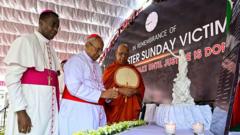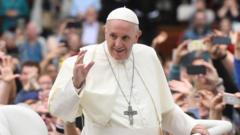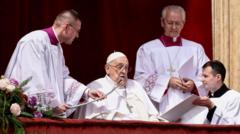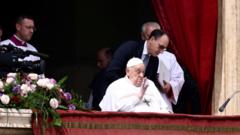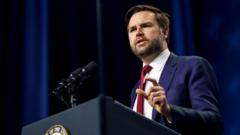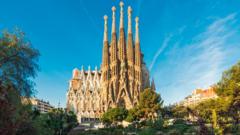In the backdrop of tradition, Pope Francis emerged as a figure of reform, facing resistance while advocating for social justice and humility.
Francis' Transformative Papacy: A Journey Beyond Tradition
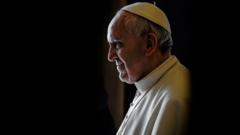
Francis' Transformative Papacy: A Journey Beyond Tradition
An Insight into the Legacy of Pope Francis and His Impact on the Catholic Church
In March 2013, the election of Pope Francis marked a historic moment in the Catholic Church as he became the first pontiff from the Americas. His Jesuit background and prior life experiences contributed to his multifaceted approach to papacy, blending traditional Catholic teachings with progressive social initiatives. Pope Francis aimed to bring a sense of humility to the Vatican, often eschewing the lavish trappings typically associated with papal authority. He famously opted for modest transportation, choosing to ride the bus with fellow cardinals rather than being driven in a limousine.
Born Jorge Mario Bergoglio in Buenos Aires on December 17, 1936, he grew up amid the struggles of a family that had fled Italy during the fascist regime. His early life included diverse experiences, from pursuing chemistry to working as a nightclub bouncer before entering the priesthood as a Jesuit. Nevertheless, his tenure was marred by controversy; accusations of insufficient opposition to the military regime in Argentina during the 1970s lingered, as did his cautious approach to liberation theology.
As he began his papacy, Francis sought to address issues that plagued the Church, including its relationship with the Eastern Orthodox Church, systematic abuse scandals, and various social injustices worldwide. He called for a Church that was more inclusive and focused on the marginalized, famously expressing a desire for a "poor Church for the poor." His diplomatic skills came to the forefront during various geopolitical events, including taking part in peace talks between Israeli and Palestinian leaders and mediating U.S.-Cuban relations.
While he remained fervent about many traditional Church values, such as opposing abortion and promoting family structures, Francis also opened dialogues about inclusivity for LGBTQ+ individuals, condemning discrimination while being cautious about terminology like "marriage."
Facing immense pressure and criticism, especially regarding allegations of mishandling child abuse cases, his papacy was not without contention. Nevertheless, he maintained a commitment to reform, emphasizing the necessity for the Church to evolve and connect more authentically with its global congregation.
Amidst health challenges, including multiple hospitalizations due to pneumonia, he continued to prioritize his mission—promoting peace and justice. By 2023, after years of significant influence, Pope Francis had progressively restructured the College of Cardinals, paving the way for a more diverse leadership within the Catholic Church. His legacy remains a complex tapestry woven from both his steadfast adherence to core Church doctrines and his unyielding push for social change and compassion.
Ultimately, Pope Francis leaves behind a Catholic Church that reflects an increased global orientation and a renewed focus on public engagement, seeking to embody a faith that goes beyond internal politics to resonate within the lives of believers worldwide.
Born Jorge Mario Bergoglio in Buenos Aires on December 17, 1936, he grew up amid the struggles of a family that had fled Italy during the fascist regime. His early life included diverse experiences, from pursuing chemistry to working as a nightclub bouncer before entering the priesthood as a Jesuit. Nevertheless, his tenure was marred by controversy; accusations of insufficient opposition to the military regime in Argentina during the 1970s lingered, as did his cautious approach to liberation theology.
As he began his papacy, Francis sought to address issues that plagued the Church, including its relationship with the Eastern Orthodox Church, systematic abuse scandals, and various social injustices worldwide. He called for a Church that was more inclusive and focused on the marginalized, famously expressing a desire for a "poor Church for the poor." His diplomatic skills came to the forefront during various geopolitical events, including taking part in peace talks between Israeli and Palestinian leaders and mediating U.S.-Cuban relations.
While he remained fervent about many traditional Church values, such as opposing abortion and promoting family structures, Francis also opened dialogues about inclusivity for LGBTQ+ individuals, condemning discrimination while being cautious about terminology like "marriage."
Facing immense pressure and criticism, especially regarding allegations of mishandling child abuse cases, his papacy was not without contention. Nevertheless, he maintained a commitment to reform, emphasizing the necessity for the Church to evolve and connect more authentically with its global congregation.
Amidst health challenges, including multiple hospitalizations due to pneumonia, he continued to prioritize his mission—promoting peace and justice. By 2023, after years of significant influence, Pope Francis had progressively restructured the College of Cardinals, paving the way for a more diverse leadership within the Catholic Church. His legacy remains a complex tapestry woven from both his steadfast adherence to core Church doctrines and his unyielding push for social change and compassion.
Ultimately, Pope Francis leaves behind a Catholic Church that reflects an increased global orientation and a renewed focus on public engagement, seeking to embody a faith that goes beyond internal politics to resonate within the lives of believers worldwide.









